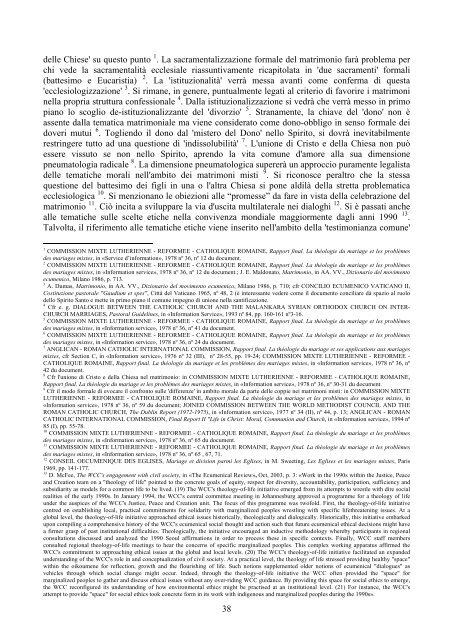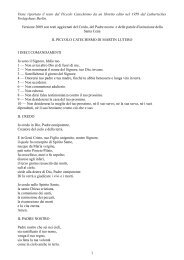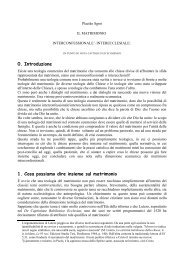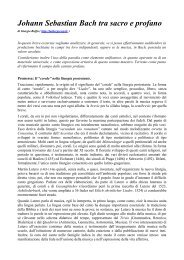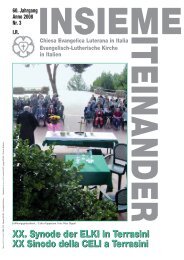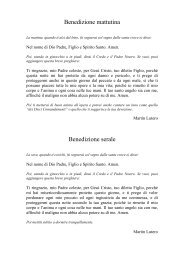Il dialogo ecumenico e interreligioso: quale futuro? - Nemesistemi
Il dialogo ecumenico e interreligioso: quale futuro? - Nemesistemi
Il dialogo ecumenico e interreligioso: quale futuro? - Nemesistemi
Create successful ePaper yourself
Turn your PDF publications into a flip-book with our unique Google optimized e-Paper software.
delle Chiese' su questo punto 1 . La sacramentalizzazione formale del matrimonio farà problema per<br />
chi vede la sacramentalità ecclesiale riassuntivamente ricapitolata in 'due sacramenti' formali<br />
(battesimo e Eucaristia) 2 . La 'istituzionalità' verrà messa avanti come conferma di questa<br />
'ecclesiologizzazione' 3 . Si rimane, in genere, puntualmente legati al criterio di favorire i matrimoni<br />
nella propria struttura confessionale 4 . Dalla istituzionalizzazione si vedrà che verrà messo in primo<br />
piano lo scoglio de-istituzionalizzante del 'divorzio' 5 . Stranamente, la chiave del 'dono' non è<br />
assente dalla tematica matrimoniale ma viene considerato come dono-obbligo in senso formale dei<br />
doveri mutui 6 . Togliendo il dono dal 'mistero del Dono' nello Spirito, si dovrà inevitabilmente<br />
restringere tutto ad una questione di 'indissolubilità' 7 . L'unione di Cristo e della Chiesa non può<br />
essere vissuto se non nello Spirito, aprendo la vita comune d'amore alla sua dimensione<br />
pneumatologia radicale 8 . La dimensione pneumatologica supererà un approccio puramente legalista<br />
delle tematiche morali nell'ambito dei matrimoni misti 9 . Si riconosce peraltro che la stessa<br />
questione del battesimo dei figli in una o l'altra Chiesa si pone aldilà della stretta problematica<br />
ecclesiologica 10 . Si menzionano le obiezioni alle promesse da fare in vista della celebrazione del<br />
matrimonio 11 . Ciò incita a sviluppare la via d'uscita multilaterale nei dialoghi 12 . Si è passati anche<br />
alle tematiche sulle scelte etiche nella convivenza mondiale maggiormente dagli anni 1990 13 .<br />
Talvolta, il riferimento alle tematiche etiche viene inserito nell'ambito della 'testimonianza comune'<br />
1<br />
COMMISSION MIXTE LUTHERIENNE - REFORMEE - CATHOLIQUE ROMAINE, Rapport final. La théologie du mariage et les problèmes<br />
des mariages mixtes, in «Service d information», 1978 nº 36, nº 12 du document.<br />
2<br />
COMMISSION MIXTE LUTHERIENNE - REFORMEE - CATHOLIQUE ROMAINE, Rapport final. La théologie du mariage et les problèmes<br />
des mariages mixtes, in «Information service», 1978 nº 36, nº 12 du document.; J. E. Maldonato, Matrimonio, in AA. VV., Dizionario del movimento<br />
<strong>ecumenico</strong>, Milano 1986, p. 713.<br />
3<br />
A. Dumas, Matrimonio, in AA. VV., Dizionario del movimento <strong>ecumenico</strong>, Milano 1986, p. 710; cfr CONCILIO ECUMENICO VATICANO II,<br />
Costituzione pastorale "Gaudium et spes", Città del Vaticano 1965, nº 48, 2 (è interessante vedere come il documento conciliare dà spazio al ruolo<br />
dello Spirito Santo e mette in primo piano il comune impegno di unione nella santificazione.<br />
4<br />
Cfr e. g. DIALOGUE BETWEEN THE CATHOLIC CHURCH AND THE MALANKARA SYRIAN ORTHODOX CHURCH ON INTER-<br />
CHURCH MARRIAGES, Pastoral Guidelines, in «Information Service», 1993 nº 84, pp. 160-161 nº3-16.<br />
5<br />
COMMISSION MIXTE LUTHERIENNE - REFORMEE - CATHOLIQUE ROMAINE, Rapport final. La théologie du mariage et les problèmes<br />
des mariages mixtes, in «Information service», 1978 nº 36, nº 41 du document.<br />
6<br />
COMMISSION MIXTE LUTHERIENNE - REFORMEE - CATHOLIQUE ROMAINE, Rapport final. La théologie du mariage et les problèmes<br />
des mariages mixtes, in «Information service», 1978 nº 36, nº 24 du document.<br />
7<br />
ANGLICAN - ROMAN CATHOLIC INTERNATIONAL COMMISSION, Rapport final. La théologie du mariage et ses applications aux mariages<br />
mixtes, cfr Section C, in «Information service», 1976 nº 32 (III), nº 28-55, pp. 19-24; COMMISSION MIXTE LUTHERIENNE - REFORMEE -<br />
CATHOLIQUE ROMAINE, Rapport final. La théologie du mariage et les problèmes des mariages mixtes, in «Information service», 1978 nº 36, nº<br />
42 du document.<br />
8<br />
Cfr l'unione di Cristo e della Chiesa nel matrimonio: in COMMISSION MIXTE LUTHERIENNE - REFORMEE - CATHOLIQUE ROMAINE,<br />
Rapport final. La théologie du mariage et les problèmes des mariages mixtes, in «Information service», 1978 nº 36, nº 30-31 du document.<br />
9<br />
Cfr il modo formale di evocare il confronto sulle 'differenze' in ambito morale da parte delle coppie nei matrimoni misti: in COMMISSION MIXTE<br />
LUTHERIENNE - REFORMEE - CATHOLIQUE ROMAINE, Rapport final. La théologie du mariage et les problèmes des mariages mixtes, in<br />
«Information service», 1978 nº 36, nº 59 du document; JOINED COMMISSION BETWEEN THE WORLD METHODIST COUNCIL AND THE<br />
ROMAN CATHOLIC CHURCH, The Dublin Report (1972-1975), in «Information service», 1977 nº 34 (II), nº 44, p. 13; ANGLICAN - ROMAN<br />
CATHOLIC INTERNATIONAL COMMISSION, Final Report II "Life in Christ: Moral, Communion and Church, in «Information service», 1994 nº<br />
85 (I), pp. 55-78.<br />
10<br />
COMMISSION MIXTE LUTHERIENNE - REFORMEE - CATHOLIQUE ROMAINE, Rapport final. La théologie du mariage et les problèmes<br />
des mariages mixtes, in «Information service», 1978 nº 36, nº 65 du document.<br />
11<br />
COMMISSION MIXTE LUTHERIENNE - REFORMEE - CATHOLIQUE ROMAINE, Rapport final. La théologie du mariage et les problèmes<br />
des mariages mixtes, in «Information service», 1978 nº 36, nº 65 , 67, 71.<br />
12<br />
CONSEIL OECUMENIQUE DES EGLISES, Mariage et division parmi les Eglises, in M. Sweeting, Les Eglises et les mariages mixtes, Paris<br />
1969, pp. 141-177.<br />
13<br />
D. McFee, The WCC's engagement with civil society, in «The Ecumenical Review», Oct, 2003, p. 3: «Work in the 1990s within the Justice, Peace<br />
and Creation team on a "theology of life" pointed to the concrete goals of equity, respect for diversity, accountability, participation, sufficiency and<br />
subsidiarity as models for a common life to be lived. (19) The WCC's theology-of-life initiative emerged from its attempts to wrestle with dire social<br />
realities of the early 1990s. In January 1994, the WCC's central committee meeting in Johannesburg approved a programme for a theology of life<br />
under the auspices of the WCC's Justice, Peace and Creation unit. The focus of this programme was twofold. First, the theology-of-life initiative<br />
centred on establishing local, practical commitments for solidarity with marginalized peoples wrestling with specific lifethreatening issues. At a<br />
global level, the theology-of-life initiative approached ethical issues historically, theologically and dialogically. Historically, this initiative embarked<br />
upon compiling a comprehensive history of the WCC's ecumenical social thought and action such that future ecumenical ethical decisions might have<br />
a firmer grasp of past institutional difficulties. Theologically, the initiative encouraged an inductive methodology whereby participants in regional<br />
consultations discussed and analyzed the 1990 Seoul affirmations in order to process these in specific contexts. Finally, WCC staff members<br />
consulted regional theology-of-life meetings to hear the concerns of specific marginalized peoples. This complex working apparatus affirmed the<br />
WCC's commitment to approaching ethical issues at the global and local levels. (20) The WCC's theology-of-life initiative facilitated an expanded<br />
understanding of the WCC's role in and conceptualization of civil society. At a practical level, the theology of life stressed providing healthy "space"<br />
within the oikoumene for reflection, growth and the flourishing of life. Such notions supplemented older notions of ecumenical "dialogues" as<br />
vehicles through which social change might occur. Indeed, through the theology-of-life initiative the WCC often provided the "space" for<br />
marginalized peoples to gather and discuss ethical issues without any over-riding WCC guidance. By providing this space for social ethics to emerge,<br />
the WCC reconfigured its understanding of how environmental ethics might be practised at an institutional level. (21) For instance, the WCC's<br />
attempt to provide "space" for social ethics took concrete form in its work with indigenous and marginalized peoples during the 1990s».<br />
38


